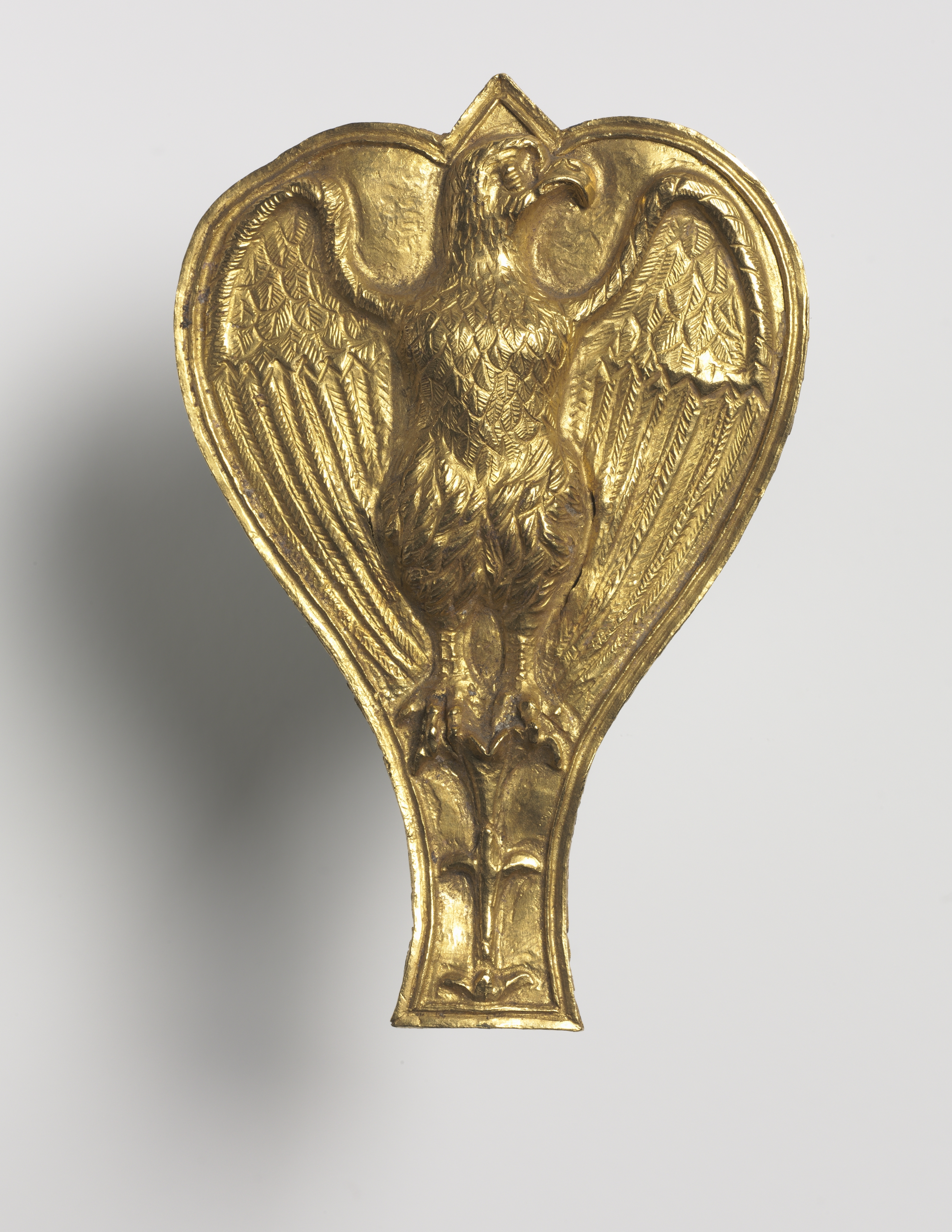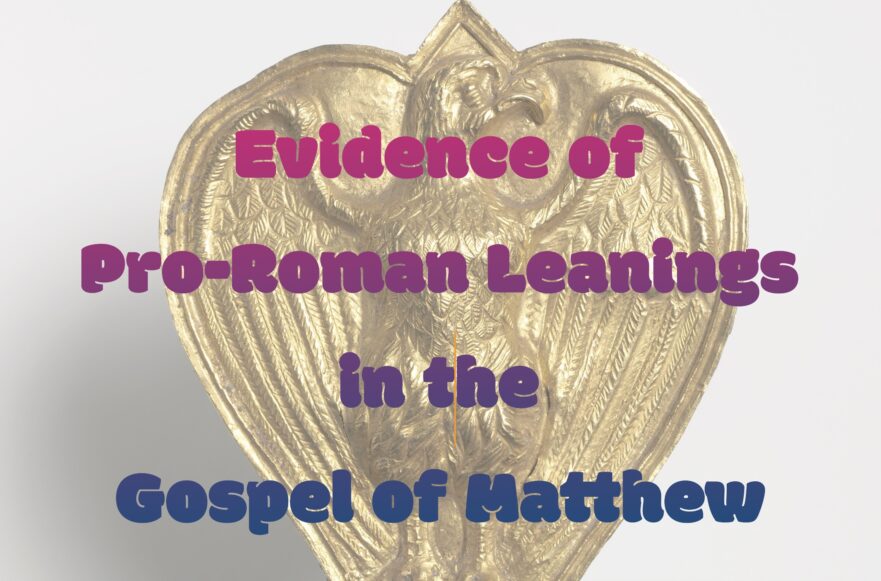How to cite this article: Joshua N. TIlton, “Evidence of Pro-Roman Leanings in the Gospel of Matthew,” Jerusalem Perspective (2024) [https://www.jerusalemperspective.com/28170/].
Josephus’ Pro-Roman Stance
Premium Members and Friends of JP must be signed in to view this content.
If you are not a Premium Member or Friend, please consider registering. Prices start at $5/month if paid annually, with other options for monthly and quarterly and more: Sign Up For Premium
Flavius Josephus, the ancient Jewish historian who was both a witness to and a participant in the first Jewish revolt against the Roman Empire (66-73 C.E.), believed that in the struggle between the Jews and the empire God was on Rome’s side. Earlier in his life Josephus had led the Galilean campaign against the Romans. At that time he must have believed differently, but after his surrender to the Romans Josephus switched his allegiance to the Roman Empire and attempted to persuade the Jewish rebels to lay down their arms. The zeal with which Josephus proclaimed to his fellow Jews his newfound loyalty to the empire won him the favor of the emperor Vespasian, and with it a comfortable lifestyle in the Roman capital after the war was ended.
Premium Members and Friends of JP must be signed in to view this content.
If you are not a Premium Member or Friend, please consider registering. Prices start at $5/month if paid annually, with other options for monthly and quarterly and more: Sign Up For Premium

- [1] Quotations from Josephus are according to the Loeb Classical Library edition: Flavius Josephus, Works (trans. H. St. J. Thackeray et al.; LCL; Cambridge, Mass.: Harvard University Press, 1926-1965). ↩
- [2] See Daniel R. Schwartz, “Josephus, Catullus, Divine Providence, and the Date of the Judean War,” in Flavius Josephus: Interpretation and History (ed. Jack Pastor, Pnina Stern, and Menahem Mor; Leiden: Brill, 2011), 331-351, esp. 338. ↩
- [3] Some Essenes, however, took part in the revolt against Rome (cf. J.W. 2:567; 3:11), evidently believing that the war of the Sons of Light against the Sons of Darkness had begun. ↩
- [4] See R. Steven Notley, “Jesus’ Jewish Hermeneutical Method in the Nazareth Synagogue” in Early Christian Literature and Intertextuality: Volume 2: Exegetical Studies (ed. Craig A. Evans and H. Daniel Zacharias; Edinburgh: T&T Clark, 2009), 46-59, esp. 56. ↩
- [5] The Gospel of John, for instance, mentions a cohort of Roman soldiers that were sent to arrest Jesus (John 18:3, 12), a detail not found in any of the Synoptic Gospels. See David Flusser, “The Gospel of John’s Jewish-Christian Source,” under the subheading “Intentions and Tendencies of the Jewish-Christian Source.” ↩
- [6] See Jesus’ critique of the “kings of the Gentiles” (i.e., the Roman emperors) included in the Gospel of Luke (Luke 22:25). ↩
- [7] See the JP articles by Shmuel Safrai, “The Centurion and the Synagogue,” and “The Synagogue the Centurion Built.” ↩
- [8] See David Flusser, “Two Anti-Jewish Montages in Matthew,” in his Judaism and the Origins of Christianity (Jerusalem: Magnes, 1988), 552-560, esp. 556. ↩
- [9] See Joshua N. Tilton and David N. Bivin, “Possessed Man in Girgashite Territory,” The Life of Yeshua: A Suggested Reconstruction (Jerusalem Perspective, 2023) [https://www.jerusalemperspective.com/26210/], Comment to L62. ↩
- [10] On the credibility of these prophecies as authentic prophecies and not later fabrications after the fact, see C. H. Dodd, “The Fall of Jerusalem and the Abomination of Desolation,” Journal of Roman Studies 37 (1947): 47-54. ↩
- [11] The Great Banquet parable is a parable not a prophecy. ↩
- [12] Some scholars wrongly claim that it was only the Temple, and not the entire city of Jerusalem, that the Romans burned. According to Josephus, the Romans set fire to the various quarters of the city as they were captured (J.W. 2:530; 4:323; 6:110, 249-253, 355, 363, 407-408, 434). ↩
- [13] See Karl Heinrich Rengstorf, A Complete Concordance to Flavius Josephus (2 vols.; Leiden: Brill, 2002), 2:16, where λεγιών, had it occurred in the works of Josephus, would have appeared. ↩
- [14] Pilate’s title was, in fact, not “procurator” but “prefect,” as proved by an inscription discovered in Caesarea Maritima. However, Tacitus may be excused this slight anachronism. ↩
- [15] Quoted according to Menahem Stern, Greek and Latin Authors on Jews and Judaism (3 vols.; Jerusalem: Israel Academy of Sciences and Humanities, 1974, 1980, 1984), 2:98 (no. 294). ↩
- [16] For a brief introduction to the historical figure, see the JP post by Marc Turnage, “Character Profile: Pontius Pilate.” ↩
- [17] With respect to the centurion’s confession we find a clear literary and theological progression from Luke to Mark to Matthew. It is difficult to imagine any Christian writer retreating from anyone’s profession of faith in Jesus’ divine sonship, but transforming a declaration of innocence into a profession of faith is a natural literary and theological development. This, along with many other such examples, gave rise to Robert Lindsey’s hypothesis that Luke is the earliest of the Synoptic Gospels, which was followed by Mark, which in turn was followed by Matthew. ↩
- [18] On the date of Matthew’s composition, see the LOY Excursus: The Dates of the Synoptic Gospels. ↩



